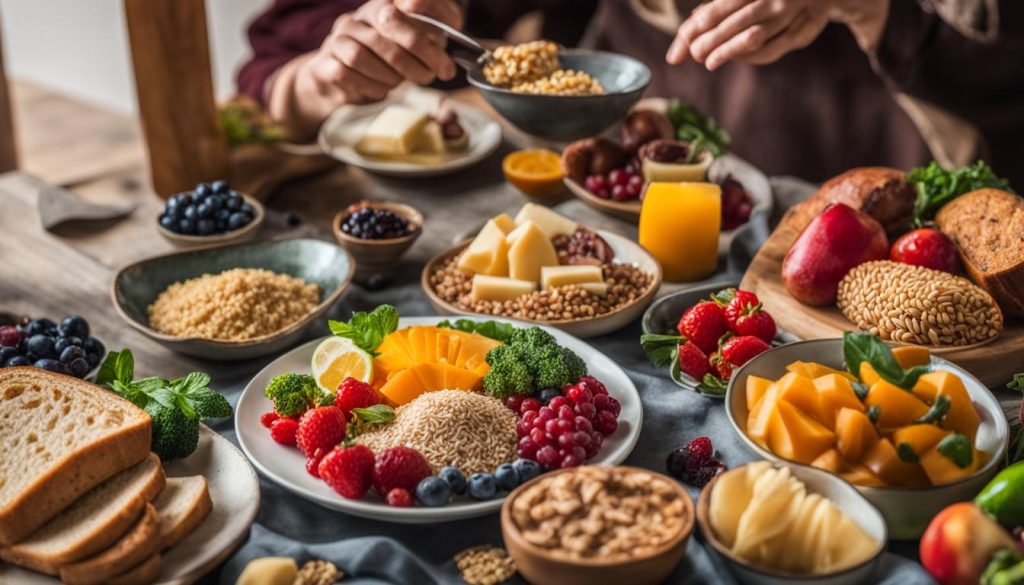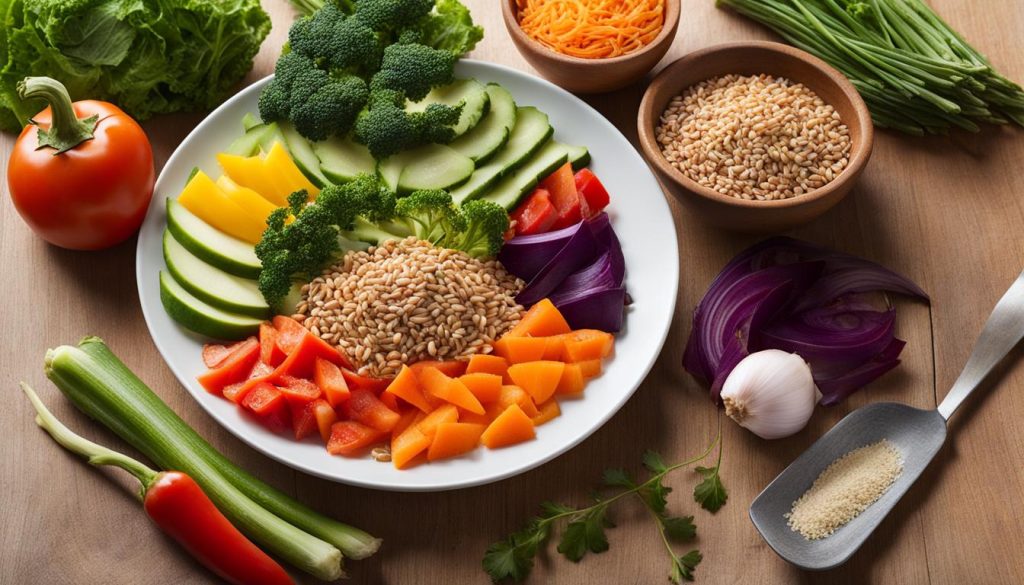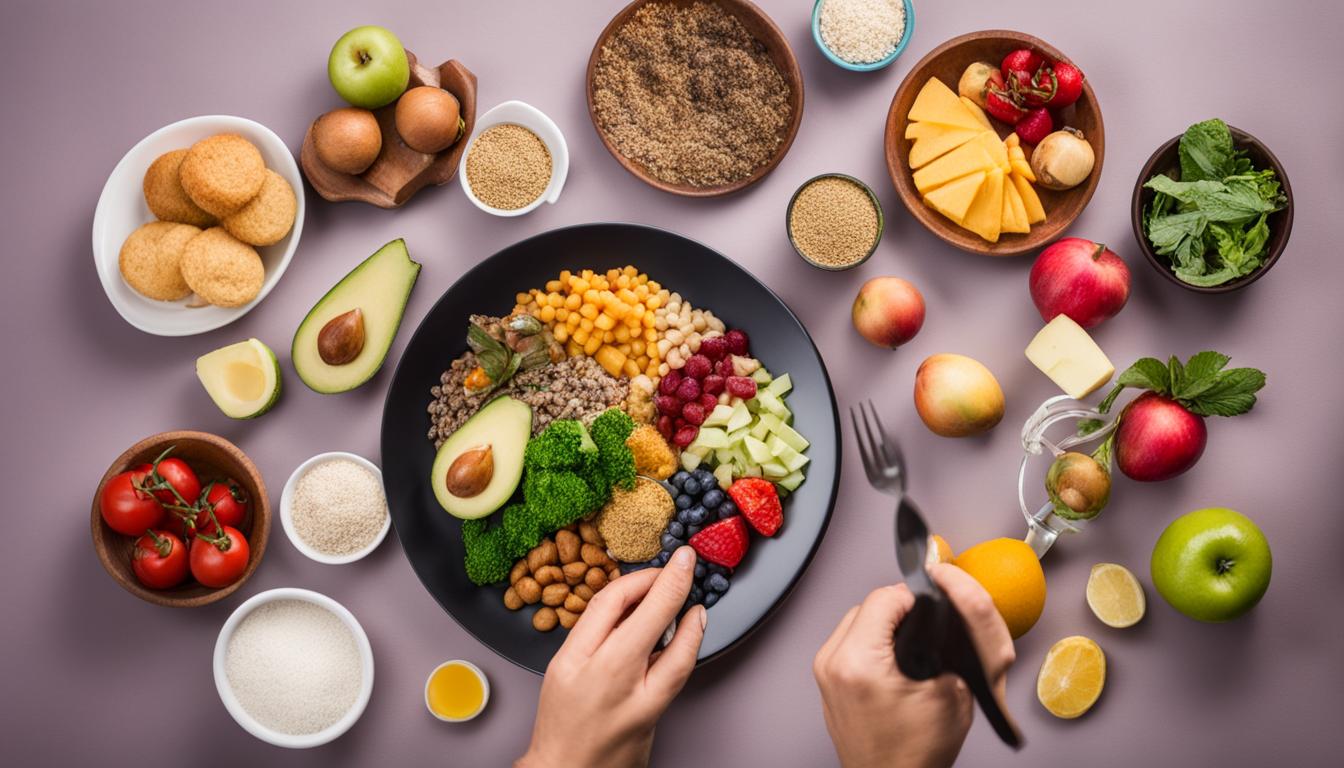In a world filled with nutrition information, it can be challenging to separate fact from fiction. This article will debunk common nutrition myths, providing you with the knowledge you need to make informed dietary choices. Let’s explore the truth behind these misconceptions and empower ourselves with evidence-based nutrition.
When it comes to your health, it’s important to have accurate information. There are countless nutrition myths circulating, causing confusion and leading to poor dietary decisions. In this article, we will tackle these common nutrition myths head-on, providing you with the truth backed by scientific evidence.
By understanding the truth behind these nutrition myths, you can make informed choices that support your overall well-being. Don’t let misinformation hold you back from achieving your health goals. Let’s debunk these myths together and pave the way for a healthier future.
Eating Healthy on a Budget
Myth: Eating healthy is too expensive. In reality, it is possible to eat nutritious meals on a budget. Here are some tips for eating healthy on a budget:
- Plan meals and snacks around sales: Keep an eye on flyers and take advantage of discounted prices on fruits, vegetables, lean proteins, and whole grains.
- Shop seasonally: Seasonal produce tends to be more affordable and fresher. Incorporate fruits and vegetables that are in season into your meal planning.
- Create a shopping list: Before heading to the grocery store, make a list of the foods you need for the week. This can help prevent impulse purchases and ensure you stay on budget.
- Stock up on staple items: When staple items like canned beans, rice, or whole-grain pasta are on sale, buy in bulk and stock up. These items have a long shelf life and can be the foundation for many budget-friendly meals.
Additionally, frozen or canned fruits and vegetables can be affordable alternatives to fresh produce. They are equally nutritious and can be used in a variety of recipes. By making smart choices, being mindful of sales, and incorporating budget-friendly foods, eating healthy can be attainable for everyone.
Affordable Healthy Meal Planning
One of the key strategies for eating healthy on a budget is meal planning. By planning your meals in advance, you can save money by buying only what you need and reducing food waste. Here are some tips for affordable healthy meal planning:
- Choose budget-friendly ingredients: Opt for affordable sources of protein like beans, lentils, and eggs. Buy whole grains in bulk and choose seasonal fruits and vegetables.
- Prepare meals in advance: Dedicate a day or two each week to meal prep. Cook large batches of meals and portion them out for the week. This can save time and money, and help you avoid unhealthy takeout options.
- Get creative with leftovers: Transform leftovers into new dishes to prevent food waste. For example, roasted chicken can be used in sandwiches, salads, or stir-fries.
- Utilize inexpensive pantry staples: Stock your pantry with affordable staples like canned tomatoes, spices, and whole grains. These items can be the base for a variety of budget-friendly meals.
With a little planning and creativity, you can enjoy nutritious meals without breaking the bank. Eating healthy on a budget is all about making smart choices and finding affordable alternatives.
Gluten-Free Diet Misconceptions

When it comes to gluten-free diets, there are certain misconceptions that need to be addressed. One of the most common myths is that everyone should follow a gluten-free diet. However, this is not true unless you have celiac disease or gluten intolerance. Gluten-containing whole-wheat products actually provide important nutrients like B vitamins and fiber. So, if you don’t have a medical reason to avoid gluten, there’s no need to eliminate it from your diet.
It’s important to be aware of the potential pitfalls of gluten-free products. Many of them may contain added sugars, salt, or refined starches to compensate for flavor and texture. This means that they may not necessarily be healthier than their gluten-containing counterparts. If you do require a gluten-free diet, make sure to read labels carefully and choose healthy options that are naturally gluten-free, such as fruits, vegetables, lean proteins, and whole grains like quinoa and rice.
By understanding the truth about gluten-free diets and making informed choices, you can ensure that you’re meeting your nutritional needs while managing any gluten-related health conditions. Whether you choose to follow a gluten-free diet or not, it’s always important to maintain a balanced and varied eating plan that is rich in nutrients. Remember, what matters most is finding a dietary approach that works best for your individual needs and preferences.
The Importance of Label Reading when Choosing Gluten-Free Products
When shopping for gluten-free products, it’s crucial to read labels carefully. Look for products that are labeled as gluten-free and have been certified by reputable organizations. Additionally, check the ingredients list for any potential sources of gluten, such as wheat, barley, or rye. Some products may also carry a “may contain gluten” warning if they are processed in a facility that also handles gluten-containing ingredients.
- Choose whole, unprocessed foods whenever possible
- Opt for naturally gluten-free grains like quinoa, rice, and corn
- Include a variety of fruits and vegetables in your diet
- Read labels carefully to avoid hidden sources of gluten
- Consider working with a registered dietitian who specializes in gluten-free diets for personalized guidance and support
By being mindful of what you eat and making informed choices, you can successfully navigate the world of gluten-free diets while ensuring that you’re meeting your nutritional needs.
The Truth About Sugar
When it comes to sugar, there are many myths and misconceptions floating around. One common myth is that replacing white table sugar with unrefined sugars is a healthier choice. However, the truth is that sugar is sugar, regardless of its source. While unrefined sugar options may contain trace amounts of vitamins and minerals, they are still considered added sugar and contribute to daily intake limits.
To maintain a healthy diet, it’s important to be mindful of overall sugar consumption and choose natural sweeteners in moderation. Whether you’re using white table sugar, honey, maple syrup, or other alternatives, the key is to limit your intake and avoid excessive amounts. Remember, the American Heart Association recommends no more than 25 grams (6 teaspoons) of added sugar per day for women and no more than 36 grams (9 teaspoons) for men.
To satisfy your sweet tooth without overdoing it, try incorporating naturally sweet foods into your diet, such as fresh fruits or even small portions of dark chocolate. These options provide natural sugars along with additional nutrients. Remember, balance is key in maintaining a healthy and well-rounded diet.
Debunking Fat-Free Myths
When it comes to fat-free products, there are many misconceptions that can lead to confusion about their role in weight management. Let’s debunk some of these myths and uncover the truth about fat-free options.
Myth: Full-fat products lead to weight gain. Contrary to popular belief, fats have important functions in the body and are not automatically linked to weight gain. Choosing heart-healthy unsaturated fats, such as olive oil, nuts, and avocados, over saturated and trans fats is key. Fat-free products often contain added sugar or sodium to compensate for the loss of flavor, and they may not keep you feeling satisfied for long.
To make informed dietary choices, it’s essential to understand that fat-free products aren’t always the healthier option. While they may have lower fat content, they may also contain higher amounts of added sugars, salt, or refined starches. These additives can negatively impact your health and undermine your weight management efforts.
The Truth About Healthy Fats
- Healthy fats, such as those found in avocados, olive oil, and nuts, play a crucial role in supporting brain function, absorbing essential vitamins, and providing long-lasting energy.
- Replacing unhealthy fats, like saturated and trans fats, with healthier alternatives can have a positive impact on your overall well-being.
When it comes to weight management, it’s important to focus on overall dietary patterns rather than solely targeting fat content. Include a variety of nutrient-dense foods in your diet, balance your calorie intake with physical activity, and make mindful choices that prioritize your long-term health and well-being.
Carbs and Weight Loss

One common misconception in the world of nutrition is that avoiding carbohydrates is the key to weight loss. While it’s true that reducing carb intake can lead to initial weight loss, completely eliminating carbs from your diet is not sustainable or healthy in the long run. Carbohydrates are an essential macronutrient that provides energy for our bodies, and they are found in foods like fruits, vegetables, whole grains, and legumes.
Instead of completely cutting out carbs, it’s important to focus on consuming the right types of carbohydrates and practicing balanced eating. Highly processed carbohydrates, such as white bread, sugary cereals, and pastries, should be limited as they provide little nutritional value and can cause blood sugar spikes. Opt for complex carbohydrates that are rich in fiber, vitamins, and minerals. Examples include quinoa, brown rice, whole wheat bread, and sweet potatoes.
Additionally, pairing carbohydrates with protein and healthy fats can help stabilize blood sugar levels and keep you feeling fuller for longer. This can be achieved by including lean proteins such as chicken, fish, tofu, or beans in your meals, as well as incorporating sources of healthy fats like avocado, nuts, and olive oil. By focusing on a balanced diet that includes a variety of nutrient-dense foods, you can achieve sustainable weight loss while still enjoying carbohydrates as part of your eating plan.
The benefits of balanced eating:
- Provides essential nutrients for overall health and well-being.
- Helps maintain stable blood sugar levels and energy throughout the day.
- Supports healthy digestion and gut health.
- Allows for a wide variety of food choices, making it easier to sustain long-term.
- Encourages a healthy relationship with food, promoting enjoyment and satisfaction.
Remember, when it comes to weight loss and overall health, balance is key. Embrace a well-rounded approach to nutrition by including a variety of food groups, including carbohydrates, in your diet. It’s not about completely eliminating certain foods, but rather making mindful choices and practicing moderation.
The Truth About Detox Diets
Detox diets have gained popularity in recent years as a way to cleanse the body and improve overall health. However, it’s important to separate fact from fiction when it comes to these trendy diets. While detox diets may promise quick weight loss and a renewed sense of well-being, the truth is that our bodies are already equipped with the organs necessary for detoxification – the liver, kidneys, and gastrointestinal tract.
These organs work together to naturally eliminate toxins, waste, and harmful substances from our bodies. There is no scientific evidence to support the claims made by commercial detox products that promise to flush out toxins or restore balance. Instead, focusing on a diet rich in whole foods can provide the nutrients and antioxidants needed for optimal health and rejuvenation.
By consuming a variety of fruits, vegetables, lean proteins, whole grains, and healthy fats, you can support your body’s natural detoxification processes. These whole foods provide essential vitamins, minerals, and fiber that contribute to overall well-being. Remember to stay hydrated by drinking plenty of water throughout the day, which also aids in the elimination of waste products. Avoiding highly processed foods and reducing added sugars and unhealthy fats can further support your body’s natural detoxification processes.
The Benefits of Whole Foods
- Whole foods contain essential nutrients that support overall health.
- They are rich in antioxidants, which help protect the body against oxidative stress and inflammation.
- Fiber found in whole foods aids in digestion and promotes regular bowel movements.
- Whole foods provide a variety of flavors, textures, and colors, making meals enjoyable and satisfying.
Practical Tips for a Healthy Lifestyle
- Focus on consuming a balanced diet that includes a variety of whole foods.
- Aim for at least five servings of fruits and vegetables per day.
- Choose lean proteins such as fish, poultry, beans, and legumes.
- Incorporate whole grains like quinoa, brown rice, and oats into your meals.
- Drink plenty of water throughout the day to stay hydrated.
- Limit processed foods, added sugars, and unhealthy fats.
- Engage in regular physical activity to support overall health and well-being.
Remember, your body is capable of detoxifying itself naturally. Instead of relying on expensive detox products or restrictive diets, focus on nourishing your body with whole foods and adopting a healthy lifestyle that supports your overall well-being.
Debunking Late-Night Eating Myths
Many people believe that eating after a certain time, like 7 p.m., will automatically lead to weight gain. However, the truth is that it’s not solely about the time on the clock, but rather the choices you make and your overall eating habits. Late-night snacking can contribute to weight gain, but it’s important to understand the underlying factors that drive this behavior.
Emotional eating, boredom, or habit can all play a role when it comes to nighttime eating. Instead of focusing solely on the time, pay attention to your hunger cues and make mindful choices about what and why you are eating. Are you genuinely hungry, or are you eating out of boredom or stress? By addressing the root causes of your nighttime eating habits, you can make positive changes and manage your weight effectively.
It’s also essential to emphasize the quality of your late-night snacks. Opt for healthier options that will keep you satisfied without sabotaging your weight management goals. Choose snacks that are rich in protein and fiber, such as a small handful of nuts or a Greek yogurt with berries. These choices can help curb your hunger and provide important nutrients while keeping your calorie intake in check.
Fat-Burning Food Myths
When it comes to weight loss and metabolism, there are many myths surrounding the concept of “fat-burning foods.” However, it’s important to understand that no specific food alone has the power to burn fat or significantly boost your metabolism. Sustainable weight loss is achieved through a well-rounded, balanced diet and regular physical activity.
While some foods may slightly increase your metabolism due to their thermogenic effect, the overall impact is minimal. Instead of focusing on specific foods, it’s more effective to focus on consuming a variety of nutrient-dense foods that support overall health and weight management. Incorporate fruits, vegetables, lean proteins, whole grains, and healthy fats into your meals to ensure you’re receiving a well-balanced diet.
There is no magic bullet when it comes to weight loss. Beware of diets or products that claim to have “fat-burning” properties. These diets often restrict certain food groups or heavily rely on specific ingredients, leading to nutrient deficiencies and an unsustainable eating pattern. Remember, achieving and maintaining a healthy weight is a result of long-term lifestyle changes, rather than quick fixes.
Sodium and Health Misconceptions
When it comes to sodium intake, there are some common misconceptions that need to be addressed. Many people believe that using less salt is enough to reduce their sodium intake. However, the truth is that the majority of the sodium consumed by Americans actually comes from processed foods and restaurant meals. So, simply cutting back on table salt may not have a significant impact on your overall sodium intake.
If you’re looking to reduce your sodium intake, it’s important to pay attention to the nutrition labels on the foods you buy. Processed foods, such as canned soups, frozen meals, and snack foods, tend to be high in sodium. Opting for fresh, home-cooked meals instead can make a big difference. By cooking from scratch, you have more control over the amount of sodium you consume, as you can choose to use less salt or substitute it with herbs and spices for flavor.
Another strategy to reduce sodium intake is to be mindful of the ingredients you use in your recipes. Look for low-sodium or no-salt-added versions of canned goods, sauces, and condiments. Additionally, rinsing canned vegetables and beans can help reduce their sodium content. These small changes can add up and contribute to a healthier overall diet.
Remember, while it’s important to watch your sodium intake, it’s not just about cutting back on salt. It’s about making smart choices and being aware of the hidden sources of sodium in your diet. By reading labels, choosing fresh ingredients, and cooking your own meals, you can take control of your sodium intake and promote better health.







